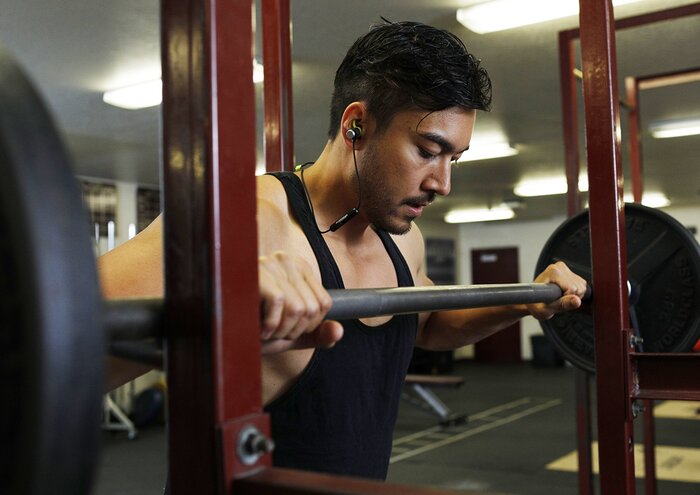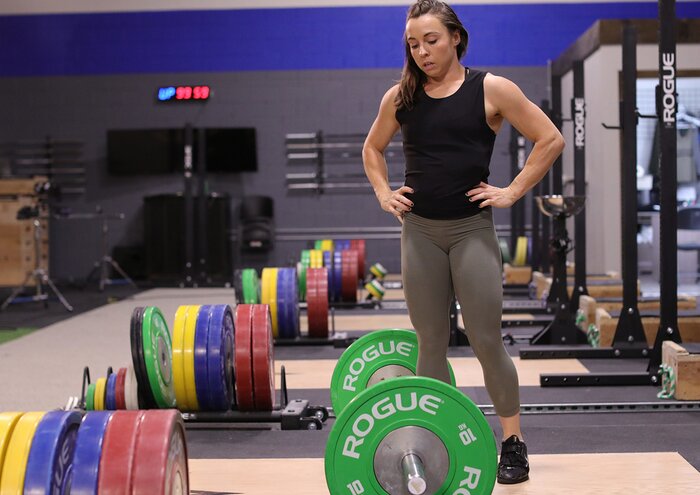How Long Does It Take Muscles To Repair After A Workout
Post-Workout Recovery | Balance Between Workouts | Active Recovery | Rest Between Sets
I've trained and pushed myself difficult over the years, and I've written programs for thousands of clients. If I've learned one thing, it's this: It's non how difficult you can do, but what you lot can recover from that matters.
What Is Recovery and How Practice You Monitor It?
Recovery is non just well-nigh performance in the moment; it'south as well your body's ability to overcome and adapt to stress after do or competition.
Lifting weights at the gym stresses your body, which then responds via various mechanisms to restore your body to its preferred "balanced" land. This means you lot tin't merely call up about recovery at the muscular level, you have to consider what exercise does to the entire body.
Your Muscle-Edifice System
Muscles need electrical impulses to drive contraction, relying on the nervous organisation to fire. The nervous system—namely, the autonomic nervous organisation, or ANS—consists of two branches:
- Sympathetic nervous system, or SNS, is the "fight or flight" co-operative. If you desire to run fast, spring high, or lift heavy, you activate your SNS to assistance you practice information technology.
- Parasympathetic nervous system, or PNS, is the "rest and digest" branch. If you want to chill out, relax, and recover, you need to actuate the PNS.
When you want to train hard, y'all need to be able to creepo upwardly your SNS and push button weight. But when it'south time to relax and recover with deep, restful sleep, you need your PNS working at a high level.
Don't let stress throw off your gains. Find the right products to aid yous get to sleep faster, stay comatose longer, and combat stress.*
VIEW ALL
You must gauge the total stress of each workout and so yous can balance your ANS—and your recovery—appropriately.
Track How Each Workout Feels
One method you can employ is charge per unit of perceived exertion, or RPE. The RPE gives you insight into non but how y'all're feeling that twenty-four hours but also how you're recovering from your sessions on average.

Use a 1-x calibration to rate how difficult a session is, with x being a grueling workout, 9 being a actually tough workout, eight existence a challenging conditioning, and then on. While information technology's non perfect, this helps you assess how you lot feel on any given twenty-four hour period, regardless of how much weight you're lifting, and whether or not you need more time off between workouts.
Calculate More than Just Book
Another way to judge how hard you trained is to actually calculate the total stress of the conditioning. Most people are familiar with total volume (sets x reps), but a critical piece of the puzzle is the load, which dictates the intensity. Instead of sets x reps, the new formula is:
- sets x reps ten load
Using this equation, hither's how two dissimilar workouts done with the 5x5 scheme would expect:
- 5 sets x 5 reps x 200 pounds = 5,000 pounds total workload
- five sets ten five reps x 400 pounds = 10,000 pounds total workload
While each workout contains identical volume (25 reps), adding in the load gives you a much amend mensurate of how challenging the workout actually is. Note that as lifters mature—either in age or in experience—they usually find that they need more intensity to force the body to adapt.
Other Factors That Affect Recovery
As we age, stress takes a bigger toll, and we don't recover as fast equally nosotros in one case did. A 20-year-old who merely worries about going to class, getting to the gym five times per week, and recovering from extracurricular activities tin take a lot of stress. By dissimilarity, a 50-year-old with teenage children at home, a total-fourth dimension job, and money problems will need more than recovery time.
Here are 3 major factors to consider when designing a weekly schedule:
- Historic period and recovery ability.
- Primary training goal (e.grand., strength focused vs. physique focused).
- Other stressors in life.
For near lifters, ii-iv sessions per week works well. Younger lifters tin usually handle more workouts, while older lifters should stick with fewer.
Become healthy muscle recovery after every workout and then you can get back to the gym and keep making gains.
VIEW ALL
Building a Meliorate Recovery Template
Once you have an idea of how hard a given training session is and how many sessions you plan to consummate per week, y'all can finally program recovery time between workouts.
When you're immature, it'south easier to become back-to-back days. As you lot historic period, you will typically need more time off between sessions. Yes, there are exceptions, and some people can train every day. Mostly, however, nearly people who railroad train hard 3-four times per week do better taking a day off between workouts.

Strength-Focused Recovery
If you're building strength, you can probably only do max try workouts twice per week. Working at that intensity means you lot'll need 48-72 hours between sessions to recover. Remember, even if your muscles feel fix, your nervous system needs a break, as well.
Having only two loftier-intensity days doesn't mean you have to have the residue of the calendar week off, though. Whether it'due south less-intense, volume-focused workouts, recovery workouts, or some other plan, there are notwithstanding options to get into the gym while you recover.
Physique-Focused Recovery
If you're more focused on physique, follow a traditional bodybuilding-style split where you lot'll hit maximal intensity on leg twenty-four hours and potentially on your back or chest day. Requite yourself a solar day off after those heavy workouts to ensure that y'all maximize your ability to recover.
Whichever goal you cull, find a training approach that lets you train hard while nonetheless maximizing recovery.

How Long Does It Take Muscles To Repair After A Workout,
Source: https://www.bodybuilding.com/content/the-science-of-muscle-recovery-how-long-should-you-rest-between-workouts.html
Posted by: warrenmisfort.blogspot.com



0 Response to "How Long Does It Take Muscles To Repair After A Workout"
Post a Comment